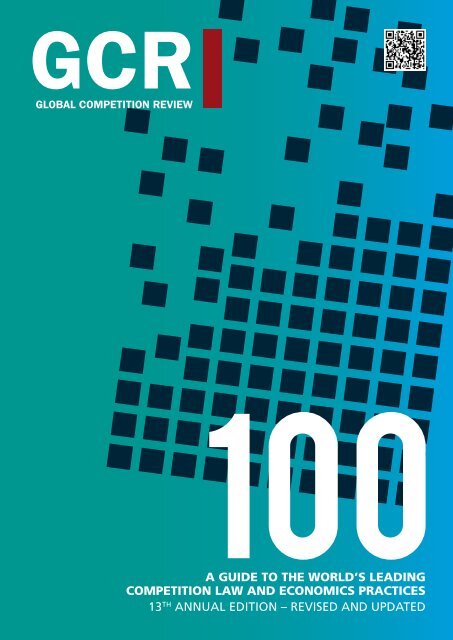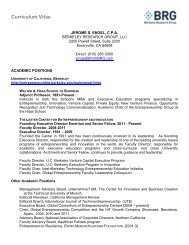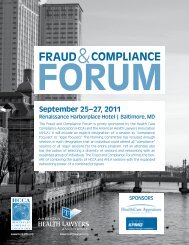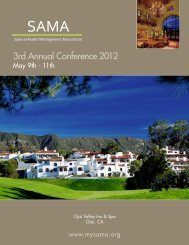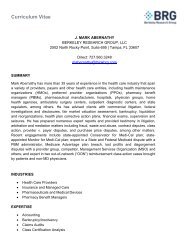GCR's Economics 20 - Berkeley Research Group
GCR's Economics 20 - Berkeley Research Group
GCR's Economics 20 - Berkeley Research Group
You also want an ePaper? Increase the reach of your titles
YUMPU automatically turns print PDFs into web optimized ePapers that Google loves.
GCRGLOBAL COMPETITION REVIEWA guide to the world’s leadingcompetition law and economics practices13 th annual edition – revised and updated
GCR 100: <strong>Economics</strong> <strong>20</strong><strong>Economics</strong> <strong>20</strong>The <strong>Economics</strong> <strong>20</strong> is GCR’s assessment of the world’s leading economic consultancies. Each entrant ismeasured using several criteria, including the size of its practice, the number of nominations to Who’sWho Legal, its reputation and its work over the past yearOver the past decade or more, the use of economics in competitionanalysis and enforcement has become increasinglyimportant.Economic analysis forms a key part of any merger review,and the deal lists of this edition’s nominated consultanciesread like a who’s who of the year’s major mergers and acquisitions– with matters including AT&T/T-Mobile, Glencore/Xstrata, Google/Motorola and NYSE/Deutsche Börse.Abuse of dominance and cartel cases also demand economicexpertise and many consultancies report expansioninto new areas such as state aid, intellectual property disputesand damages litigation.“One change we have seen in recent years is the growthof private actions before national courts,” says Gunnar Nielsof Oxera. “Economists work as often with litigation lawyersand barristers as with competition lawyers.”While the economist’s toolkit remains the same, problemsare becoming ever more complex. Agencies too requirea higher level of economic evaluation and more frequentlyretain their own experts. Cristina Caffarra, at Charles RiverAssociates (CRA), says the European Commission hasdeveloped its economics capabilities enormously over thepast decade and now engages in increasingly “sophisticatedeconomic analyses, not only responding to the parties’ submissionsbut also developing their own”.Many of the major firms in this year’s <strong>Economics</strong> <strong>20</strong> havebeen at the top since our first edition – NERA, CRA andRBB <strong>Economics</strong> remain significant forces. CRA this yearovertook NERA as the second-largest competition consultancyafter the dispersal of several NERA experts to rivalconsultancies. Compass Lexecon, meanwhile, formed fromthe merger of Lexecon and Competition Policy Associates in<strong>20</strong>08, towers over its rivals in terms of size, thanks in part toits recruitment of ex-LECG staff.Caffarra also says that while individuals move and mayregroup under different flags, ultimately clients look forestablished credibility and reputation at both individual andfirm level.Caffarra says the reason behind the market’s relative stabilityis the importance of established reputations and longstandingrelationships with law firms, which will often relyon the same consultancy for a succession of cases. “Whilethe market is always interested in people with bright ideas,economists are in the end ‘experience goods’,” she says.Law firms will typically rely on individuals who haveperformed well for them in previous cases, and this meansit may take some time for newcomers to establish a profile.The two new firms in this year’s <strong>Economics</strong> <strong>20</strong>, however,both field well-established names in the world of competitioneconomics – US consultancy <strong>Berkeley</strong> <strong>Research</strong> <strong>Group</strong>and UK-based AlixPartners. <strong>Berkeley</strong> has an impressive sixnominees to The International Who’s Who of CompetitionLawyers & Economists among its 75 experts in competition.At AlixPartners, Who’s Who Legal nominee and practicehead Liam Colley has earned an excellent reputationamong his peers and clients. He leads a team of nine, mainlyLondon-based competition experts.The consultancies range from national-based practiceswith a handful of experts, to global firms with over <strong>20</strong>0specialists and a range of complimentary practices outsidecompetition. Niels outlines the benefits of a diversified firm.“Combining competition with a financial economics practiceis essential for advising on matters concerning damages,state aid, the failing firm defence and the inability to pay afine,” says Niels.Both international and domestic firms feature on thelist – economics is more portable than law, and specialistscan advise on transactions taking place on the other side ofthe globe. Niels reports that Oxera economists in Oxford,London and Brussels last year worked on cases in Romania,Australia, Brazil and the USA, to name a few.Individual talent remains a key part of a firm’s success,and its consultants’ placings in Who’s Who Legal are animportant barometer by which to evaluate firms. Here, CRAand Compass Lexcon have the most nominees, while otherfirms are impressively represented, with some – such asZoltan Biro at Frontier <strong>Economics</strong> and Derek Ridyard RBB<strong>Economics</strong> – being nominated to every edition of Who’s WhoLegal since it was was launched 15 years ago.This year saw the loss of two such talents who helped shapethe development of competition economics: Halbert White,co-founder of Bates White and professor of economics at theUniversity of California, and Gary Dorman, senior vice presidentof NERA Economic Consulting, who both passed away.www.globalcompetitionreview.com 227
GCR 100: <strong>Economics</strong> <strong>20</strong>GCR 100Senior hires, departures and promotionsConsultancyNo. of lateral hires<strong>Berkeley</strong> <strong>Research</strong> <strong>Group</strong> 9RBB <strong>Economics</strong> 8Charles River Associates 8Compass Lexecon 5ConsultancyNo. of departuresNERA Economic Consulting 8RBB <strong>Economics</strong> 6Compass Lexecon 4ConsultancyNo. of internal promotionsRBB <strong>Economics</strong> 4Compass Lexecon 4Tendências Consultoria Integrada 4NERA Economic Consulting 3New entrant <strong>Berkeley</strong> <strong>Research</strong> <strong>Group</strong> topped this year’shires chart thanks to its nine additions. The consultancyhired six directors and three principals, while no senioreconomist left its competition practice over the year.At the other end of the spectrum, NERA EconomicConsulting saw more departures than any other consultancy,losing eight specialists – about a third of its senior team. Thiswas only partially compensated by three promotions.Compass Lexecon’s growth slowed down this year.After adding 24 senior specialists last year, in <strong>20</strong>12 it hiredfive new economists and promoted four, while also losingfour. Only two senior competition economists left CharlesRivers Associates, which hired eight new specialists. RBB<strong>Economics</strong> built on last year’s expansions, adding 12 specialiststo its senior ranks, but turnover remained high, withsix economists leaving the firm.competition specialists following the break-up of LECG,this year Compass has continued to grow and added morethan <strong>20</strong> economists. Fourth-placed Bates White’s practiceremained more or less stable this year, and so did most of theother largest consultancies. <strong>Berkeley</strong>’s 75 competition specialistshelped the consultancy make its entry in fifth place.Most specialised consultancyConsultancy% of competition economistsCase Associates 100LEAR 100RBB <strong>Economics</strong> 100E.CA <strong>Economics</strong> 100Compass Lexecon 81Bates White LLC 71Economists Incorporated 61CEG 60AlixPartners 60Oslo <strong>Economics</strong> 50The same four firms remain entirely focused on competitioneconomics as last year – Case Associates, LEAR, RBB<strong>Economics</strong> and E.CA <strong>Economics</strong>. Compass Lexecon continuedto be a highly specialised consultancy, with over 80per cent of its economists working on competition matters.More than half of new entrant AlixPartners’ economists specialisein competition. Among the largest and most prestigiousfirms in the survey, NERA and CRA remain out of thelist as they combine their antitrust groups with large practicesactive outside the field of competition economics.Most Who’s Who Legal nomineesMost competition specialistsConsultancy name No. of competition specialistsCompass Lexecon 282Charles River Associates 130NERA Economic Consulting 113Bates White LLC 91<strong>Berkeley</strong> <strong>Research</strong> <strong>Group</strong> 75PricewaterhouseCoopers 55Cornerstone <strong>Research</strong> 53RBB <strong>Economics</strong> 50Frontier <strong>Economics</strong> 45The Brattle <strong>Group</strong> 44This year, Charles River Associates leapt to second placeby adding 19 economists to its practice. The firm overtookNERA, which shrank by seven people. Compass Lexeconcontinues to claim the top spot in the table, with morethan double the headcount of its closest competitors. Aftera dramatic increase in <strong>20</strong>11, when the firm hired 69 moreConsultancyWho’s Who Legal nomineesCharles River Associates 28Compass Lexecon 27NERA Economic Consulting 12RBB <strong>Economics</strong> 12Bates White LLC 7Frontier <strong>Economics</strong> 6<strong>Berkeley</strong> <strong>Research</strong> <strong>Group</strong> 6Charles River Associates continues to claim the top spot inthe table for firms with the most Who’s Who Legal nominees.Its position is now threatened by the continuing growth ofCompass Lexecon, which added three more nominees thisyear after almost doubling its figures last year. CRA andCompass are now head-to-head with 28 and 27 nomineesrespectively. RBB added one Who’s Who Legal nominee thisyear, bringing its total figure to 12. This was just enough tomatch NERA’s result, which lost five nominees from <strong>20</strong>11.Bates White made it into the list this year with its seven nominees,followed by Frontier <strong>Economics</strong> and <strong>Berkeley</strong>, whichcount six nominees apiece.228 global competition review
GCR 100: <strong>Economics</strong> <strong>20</strong>A guide to the <strong>Economics</strong> <strong>20</strong>Global headThis indicates the leader of each consultancy’s competitionpractice. In several instances, there is more than one individuallisted.Percentage of the firm specialised in competitionThis figure indicates the ratio of economists at the consultancywho specialise in competition economics, comparedwith the firm as a whole.GCR 100Home jurisdictionThis indicates the country where the consultancy firstoperated.Total size of the firmThis figure indicates the total number of economists at theconsultancy.Number of competition economistsThis figure indicates the total number of economists specialisingin competition economics. A specialist is someone whospends at least 60 per cent of his or her billable time workingon competition matters.Economic consultancies use different terms to refer tosenior and junior specialists. As such, we have grouped thecompetition specialists at each consultancy in the same way.• <strong>Group</strong> one: equivalent to a partner in a law firm, wholeads major matters.• <strong>Group</strong> two: equivalent to a non-equity partner in a lawfirm, who leads cases but is not at a top level position.• <strong>Group</strong> three: equivalent to an associate with at least sixyears’ experience in a law firm, and who is on track forthe second group.• <strong>Group</strong> four: equivalent to an associate within a law firm,with less than six years’ experience.Number of Who’s Who Legal nomineesThis indicates the number of economists who appear inGCR’s sister publication, The International Who’s Who ofCompetition Lawyers & Economists.Number of lateral hiresThis figure indicates how many competition specialists joinedthe consultancy at group one or group two level between 31July <strong>20</strong>11 and 1 August <strong>20</strong>12.Number of departuresThis figure indicates the number of group one or grouptwo level competition specialists who left the consultancybetween 31 July <strong>20</strong>11 and 1 August <strong>20</strong>12. This does notspecify the reason for leaving but does include retirement.Number of internal promotionsThis figure indicates how many competition specialists werepromoted to group one between 31 July <strong>20</strong>11 and 1 August<strong>20</strong>12.CommentaryThis section provides a picture of the largest matters thateach consultancy handled between 31 July <strong>20</strong>11 and 1 August<strong>20</strong>12, though we make every effort to include significantdevelopments since the end of this period, in the interestsof making the publication as relevant as possible. We askedevery consultancy in the <strong>Economics</strong> <strong>20</strong> to tell us about theirheadline cases of the last year, as well as any other interestingwork that didn’t attract as much press coverage.www.globalcompetitionreview.com 229
GCR 100: <strong>Economics</strong> <strong>20</strong><strong>Berkeley</strong> <strong>Research</strong> <strong>Group</strong>GCR 100Global heads:Henry Kahwaty, David Kaplan,David ScheffmanHome jurisdiction:United StatesTotal size of firm: 399No. of competition economists: 75% of firm specialised: 19Who’s Who Legal nominees: 6<strong>Group</strong> one: 27<strong>Group</strong> two: 16<strong>Group</strong> three: 12<strong>Group</strong> four: 18Part-time consultants: 2No. of lateral hires: 9No. of departures: 0No. of internal promotions: 1New entrant <strong>Berkeley</strong> saw impressive growth last year,attracting six directors and three principals from rivalsincluding the Brattle <strong>Group</strong>, NERA and KPMG, without losinga single senior economist. Practice heads David Kaplanand David Scheffman are two of the firm’s six nominees toWho’s Who Legal, half of whom are based in the Emeryville,California office.In merger matters, the consultancy has helped to analysethe competitive effects of tie-ups in the waste, avionics, mining,chemicals and computer industries. On the behaviouralside, <strong>Berkeley</strong> provided analysis in the Apple v Samsunglitigation. It has also worked on a monopolisation investigationrelated to network providers to health insurance companies,and has assessed market power issues arising fromthe expansion of a pipeline system in Canada.230 GLOBAL COMPETITION REVIEW


